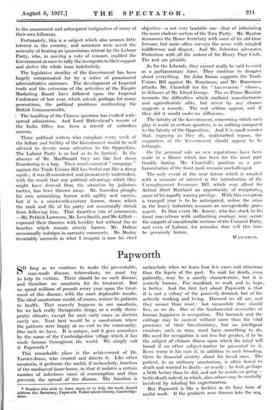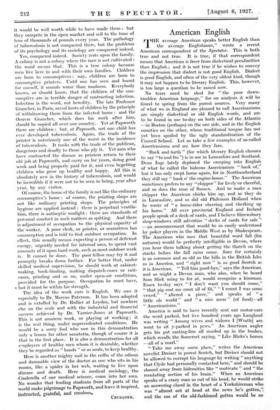Papworth
SO longas we continue to make the preventable, man-made disease, tuberculosis, we must try /1/4-1 to help its victims. There should be no such disease, and therefore no sanatoria for its treatment. But we spend millions of pounds every year upon the treat- ment of this disease, with the most deplorable results. The ideal sanatorium would, of course, restore its patients to health. That scarcely happens in our sanatoria, for we lack really therapeutic drugs, or a really thera- peutic climate, except for such early cases as doctors rarely see. Next best would be a sanatorium where the patients were happy at no cost to the community. One such we have. It is unique, and it goes nowadays by the name of the "Cambridgeshire village which it has made famous throughout the world. We simply call it Papworth.* SO longas we continue to make the preventable, man-made disease, tuberculosis, we must try /1/4-1 to help its victims. There should be no such disease, and therefore no sanatoria for its treatment. But we spend millions of pounds every year upon the treat- ment of this disease, with the most deplorable results. The ideal sanatorium would, of course, restore its patients to health. That scarcely happens in our sanatoria, for we lack really therapeutic drugs, or a really thera- peutic climate, except for such early cases as doctors rarely see. Next best would be a sanatorium where the patients were happy at no cost to the community. One such we have. It is unique, and it goes nowadays by the name of the "Cambridgeshire village which it has made famous throughout the world. We simply call it Papworth.* This remarkable place is the achievement of Dr. Varrier-Jones, who created and directs it. Like other sanatoria, it performs the useful, if melancholy, function of the mediaeval lazar-house, in that it isolates a certain number of infectious cases of consumption and thus prevents the spread of the disease. The function is * Readers who wish to learn more. Or to help the work, should address the Secretary,- Papworth Tuberaulosis Colony, Cambridge. shire. melancholy when we learn how few cases end otherwise than the lepers of the past. To wait for death, even patiently, may be a saintly characteristic, but it is scarcely human. For mankind, to work and to hope. is better. And the first fact about Papworth is that it is not a colony of the passively doomed, but of the .actively working and living. Doomed we all are, and they sooner than most : but meanwhile they should live, as we do. One of the fundamental necessities of human happiness is occupation. The barnacle and the cabbage may be content without more than the vital processes of their bio-chemistry, but an intelligent creature, such as man, must have something to do. His need for occupation is not less but greater, if he be the subject of chronic illness upon which his mind will brood if no other subject-matter be presented to it. Even worse is his case if, in addition to such brooding, there be financial anxiety about his loved ones. The patient, in an ordinary sanatorium, is often bored to death and worried to death—or nearly : he feels perhaps a little better than he did, and out he insists on going— to his death indeed, in which, alas, others may be mortally involved by inhaling his expectoration. • But Papworth is like a beehive in its busy hum of useful work. If the prOdUcti were thrown into the sea, it would be well worth while to have made them : but they compete in the open market and sell to the tune of tens of thousands of pounds every year. The pathology of tuberculosis is not conquered there, but the problems of its psychology and its sociology are conquered indeed.
Yes, conquered indeed. Society rests upon the family. A colony is not a colony where the race is not cultivated : the word means that. This is a true colony because men live here in and with their own families. Children are born to consumptives : nay, children are born to consumptive printers. Until one has seen and learnt for oneself, it sounds worse than madness. Everybody knows, or should know, that the children of the con- sumptive are in terrible danger of contracting infection. Infection is the word, not heredity. The late Professor Grancher, in Paris, saved hosts of children by the principle of withdrawing them from the infected home : and the Oeuvre Grancher, which does his work after him, should be copied all over our country. Yet at Papworth there are children : but, at Papworth, not one child has ever developed tuberculosis. Again, the trade of the printer is notoriously one of the worst in the incidence of tuberculosis. It ranks with the trade of the publican, dangerous and deadly to those who ply it. Yet men who have contracted the disease as printers return to their old job at Papworth, and carry on for years, doing good work and being properly paid for it, and even begetting children who grow up healthy and happy. All this is absolutely new in the history of tuberculosis, and would be incredible if it were not to be seen in being, year after year, by any visitor.
Of course, the home of the family is not like the ordinary consumptive's home : of course, the printing shops are not like ordinary printing shops. The principles of hygiene are applied instead : there is perpetual ventila- tion, there is antiseptic sunlight : there are standards of personal conduct in such matters as spitting. And there is adjustment of occupation to the physical capacity of the worker. A poor clerk, or printer, or seamstress has consumption and is told to find outdoor occupation. In effect, this usually means expecting a person of deficient energy, urgently needed for internal uses, to spend vast amounts of it upon hard work, such as most outdoor work is. It cannot be done. The poor fellow may try it and promptly breaks down further. Far better that, under skilled medical supervision, he should work at cabinet- making, book-binding, making dispatch-cases or suit- cases, printing and so on, under open-air conditions, provided for the purpose. Occupation he must have, • but it must be within his strength.
The idea of the work cure is English. - We owe it especially to Dr. Marcus Paterson. It has been adopted and is extolled by Dr. Rollier at Leyden, but nowhere else on the scale and with the industrial and financial success achieved by Dr. Varrier-Jones at Papworth. This is not amateur work, or playing at working ; it is the real thing, under unprecedented conditions. He would be a sorry fool who saw in this demonstration only a lesson for other sanatoria, though of course it is that in the first place. It is also a demonstration for all employers of healthy men whom it is desirable, whether they be regarded as " hands " or as souls, to keep healthy.
Here is another mighty nail in the coffin of the odious and damnable view of the doctor as one who sits in his rooms, like a spider in her web, waiting to live upon disease and death. Here is medical sociology, the Cinderella of our medical science, come into her own. No wonder that leading students from all parts of the world make pilgrimage to Papworth, and leave it inspired, instructed, grateful, and emulous, CRUSADER.







































 Previous page
Previous page